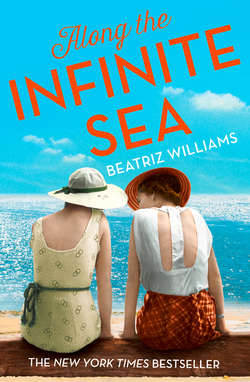Читать книгу Along the Infinite Sea: Love, friendship and heartbreak, the perfect summer read - Beatriz Williams, Beatriz Williams - Страница 16
2.
Оглавление“Borrow me?” I jogged to keep up as my brother’s long legs tore the scrubby grass between the garden and the cliffs. “Are you short for poker?”
“Of course not.” He yanked the cigarette stub from his mouth and tossed it on the ground, into a patch of gravel. “What the hell were you doing with that Nazi?”
“Nazi? He’s a Nazi?”
“They’re all Nazis now, aren’t they? Pay attention, it’s the cliff.”
I wasn’t dressed for climbing. I gathered up my skirts in one hand. We started down the path, over the lip of the cliff, and the sea crashed in my ears. I followed the flash of Charles’s shoes just ahead. “What’s the hurry?” I asked.
“Just be quiet.”
The last of the light from the house had dissolved, and I began to stumble in the absolute blackness of the night. I had only the faint ghostliness of Charles’s white shirt—he had somehow shed his dinner jacket—to guide me, as it jerked and jumped about and nearly disappeared in the space before me. The toe of my slipper found a rock, and I staggered to the ground.
“What’s the matter with you?” Charles said.
“I can’t see.”
He swore and fumbled in his pockets, and a second later a match struck against the edge of a box and hissed to life. “My God,” I said, staring at Charles’s face in the tiny yellow glow. “Is that blood?”
He touched his cheek. “Probably. Look around. Get your bearings.”
I looked down the slope of the cliff, the familiar path dissolving into the oily night. “Yes. All right.”
The match sizzled out against his fingers, and he dropped it into the rocks and took my hand. “Let’s go. Try to keep quiet, will you?”
I knew exactly where I was now. I could picture each stone, each twist in the jagged path. Inside the grip of Charles’s hand, my fingers tingled. Something was up, something extraordinary—so extraordinary, my brother was actually drawing me under the snug shelter of his confidence. Like when we were children, before Mummy died, before we returned to France and went our separate ways: me to the convent, my brother to the École Normale in Paris. That was when the curtain had come down. I was no longer his co-conspirator.
But I remembered how it was. My blood remembered: racing down my limbs, racing up to my brain like a cleansing bath. Come down to the beach, I’ve found something, Charles would say, and we would run hand in hand to the gritty boulder-strewn cove near the lighthouse, where he might show me an old blue glass bottle that had washed up onshore and surely contained a coded message (it never did), or a mysterious dead fish that must—equally surely—represent an undiscovered species (also never); and once, best of all, there was a bleached white skeleton, half articulated, its grinning skull exactly the size of Charles’s spread hand. I had thought, We’re in trouble now, someone will find out, someone will sneak into the house and kill us, too, to eliminate the witnesses; at the same time, I had cast about for the glimpse of wood that must be lying half hidden in the nearby sand, the treasure chest that this skeleton had guarded with his life.
Now, as I stumbled faithfully down the cliff path in Charles’s wake, and my eyes so adjusted to the darkness that I began to pick out the white tips of the waves crashing on the beach, the rocks returning the starlight, I wondered what bleached white skeleton he had found for me tonight.
And then the path fell into the sand, and Charles was tugging me through the dunes with such strength that my slippers were sucked away from my feet. We made for the point on the eastern end of the beach, where the sea curled around a finger of cliff and formed a slight cove on the other side. There was just enough shelter from the current for a small boathouse and a launch, which the guests sometimes used to ferry back and forth to the yachts in Cannes or Antibes. I saw the roof now, a gray smear in the starlight. Charles plunged straight toward it, running now. The sand flew from his feet. Just before he ducked through the doorway, he stopped and turned to me.
“You did say you nursed in a hospital, right? At the convent? I’m not imagining things?”
“What? Yes, every day, after—”
“Good.” He took my hand and pulled me inside.
There were four of them there, Charles’s friends, two of them still in their dinner jackets and waistcoats. An oil lantern sat on the warped old planks of the deck, next to the nervously bobbing launch, spreading just enough light to illuminate the fifth man in the boathouse.
He sat slumped against the wall, and his bare chest was covered in blood. He lifted his head as I came in—the chin had been tucked into the hollow of his clavicle—and he said, in deep German-accented English, much like the voice of Herr von Kleist, only more slurred and amused: “This is your great plan, Créouville?”
